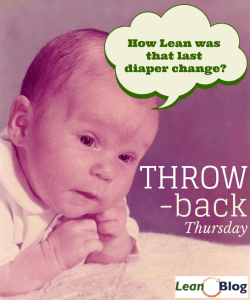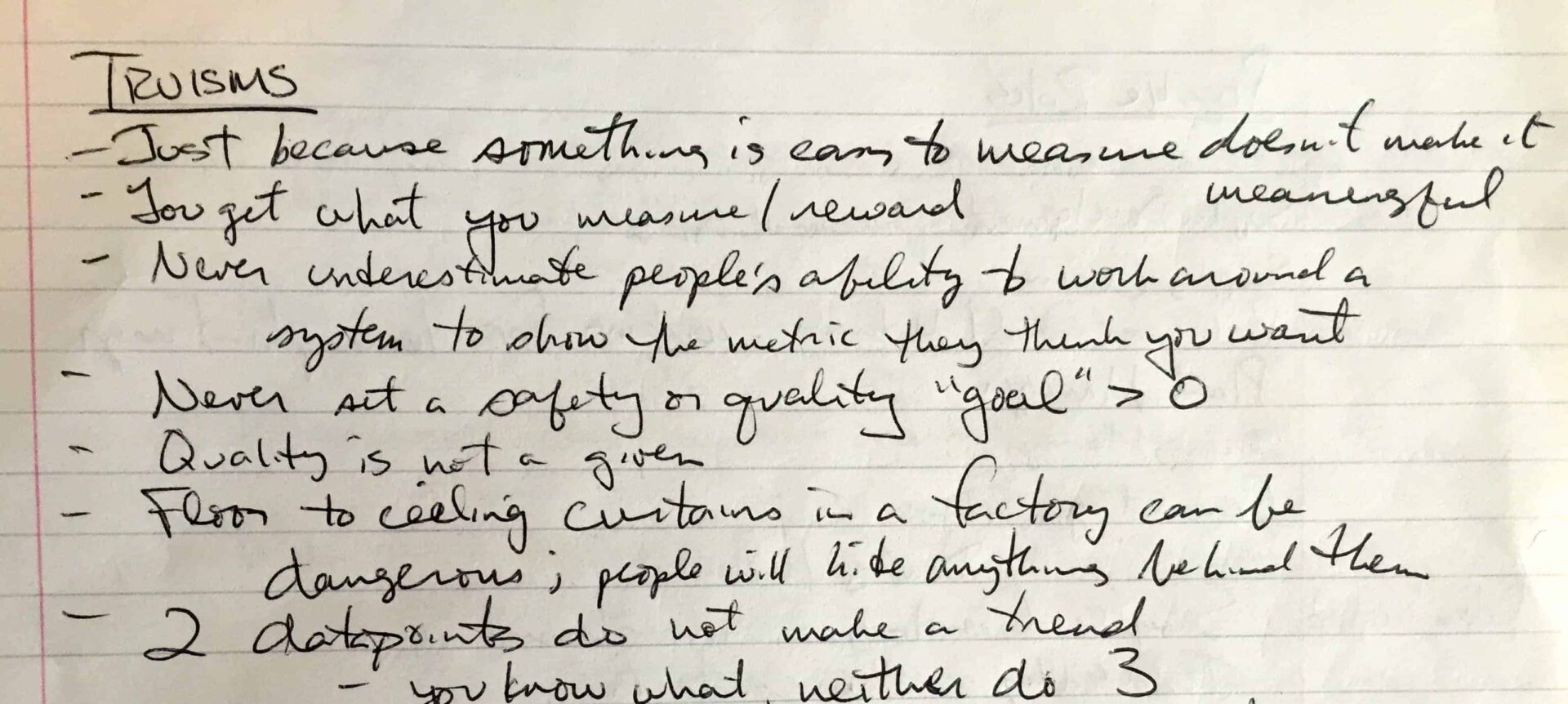
I have been going through some old papers recently and I found two sheets of paper with hand-written thoughts or “truisms” that I had scribbled down in early 2002. The word truism, it turns out, doesn't mean “true” so much as it means “a statement that is obviously true and says nothing new or interesting.” Oops.
This was a list of things I had learned after two years at GM, two years at MIT, two years at Dell Computer, and just over a year at a startup.
These aren't all original thoughts, by any means, but I had written them down when I was in between jobs (the startup had a real cash crunch after 9/11). If Twitter had existed, I might have tweeted many of the thoughts on that paper. Not all of them are under 140 characters, but here some of the things on that sheet from 13 years ago.
Current thoughts I'm adding are in italics.

Listen to Mark read the post (Learn more and subscribe):
1) Just because something is easy to measure, doesn't make it meaningful.
This happens a lot in healthcare, measuring the things that are easy to measure while some of the things that really matter are difficult to measure.
2) You get what you measure / reward.
Even if it creates a lot of dysfunction, like the VA mess.
3) Never underestimate people's ability to work around a system to show the metric they think you want.
Never underestimate people's ability to work around a system to show the metric they think you want. Share on XAgain, see the VA mess
4) Never set a safety or quality “goal” > 0
Paul O'Neill talks a lot about the only morally defensible goals being zero.
5) Quality is not a given.
I've actually heard people in hospitals say, “Well, quality is a given.” But they don't have anything close to perfect quality.
6) 2 data points do not make a trend… you know what, neither do 3.
2 data points do not make a trend... you know what, neither do 3. Share on XThis is a topic I've blogged about a lot in recent years, including here and here.
7) Don't manage the metric, manage the process and lead the people.
8) You don't build relationships or lead via email.
I still need to remind myself of this sometimes.
9) A sudden increase in whispering or closed door meetings is the sign of a problem.
10) The best single metric of an organization's health is the number of email messages sent BCC.
BCCs are often a sure sign of “CYA” (cover your butt) activities
11) Never copy tools that someone else uses (Toyota kanban) without understanding why they're helpful and the situations where they're not applicable.
12) If you do not explicitly attempt to define and mold the culture, it will define itself. You might not like what develops!
13) Make sure you're learning from your employees.
14) Performance evaluations cause more harm than good.
I was really happy to do a podcast with Prof. Sam Culbert on this topic.
15) Understand what motivates your employees and what they aspire to.
16) Beware of “programs” such as Six Sigma and ISO-9001.
The same could be said about “Lean” if it's just a program.
17) Always post metrics openly and explain them. Make sure they're updated!
I'd add “update them as frequently as possible, not just monthly.”
18) A kaizen event performed on a non bottleneck is just practice!
19) In a new job, fight the pressure to “do something.” First, build trust and search for the right levers.
20) The customer doesn't want a drill, they want a hole.
This idea gets continually rediscovered by people, including in the Lean Startup movement.
21) Leaders have a responsibility to their employees and community. Deal with it.
22) Never call a meeting by its time, such as “the 8:30 meeting.” That will guarantee the meeting becomes just a habit even when its purpose is gone or lost.
23) Make sure somebody vocally disagrees with you every day. If not, they're scared of you.
That's the end of my old truisms.
I'll stand by those ideas today… what do you think? Do you have any “truisms” that you've discovered, learned, or come up with on your own? Leave a comment and join the conversation.
Please scroll down (or click) to post a comment. Connect with me on LinkedIn.
Let’s work together to build a culture of continuous improvement and psychological safety. If you're a leader looking to create lasting change—not just projects—I help organizations:
- Engage people at all levels in sustainable improvement
- Shift from fear of mistakes to learning from them
- Apply Lean thinking in practical, people-centered ways
Interested in coaching or a keynote talk? Let’s start a conversation.




![When Was the Last Time a Leader Around You Admitted They Were Wrong? [Poll]](https://www.leanblog.org/wp-content/uploads/2025/07/Lean-Blog-Post-Cover-Image-2025-07-01T212509.843-238x178.jpg)


![When Was the Last Time a Leader Around You Admitted They Were Wrong? [Poll]](https://www.leanblog.org/wp-content/uploads/2025/07/Lean-Blog-Post-Cover-Image-2025-07-01T212509.843-100x75.jpg)


All success and all failure is laid at the feet of leadership – not followship.